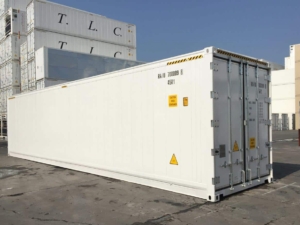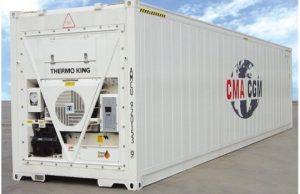In the bustling world of global trade and logistics, refrigerated shipping containers play a pivotal role in transporting perishable goods across vast distances. These temperature-controlled containers, often referred to as “reefers,” are the unsung heroes ensuring that our fruits, vegetables, pharmaceuticals, and other temperature-sensitive items reach their destinations in pristine condition. To guarantee the seamless operation and longevity of these essential containers, a robust maintenance regimen is crucial. Let’s explore the novel and effective practices recommended to uphold the optimal performance of refrigerated shipping containers.

1. Regular Temperature Calibration Checks
One of the fundamental aspects of maintaining a refrigerated shipping container is to ensure that its temperature settings are accurate. Regular calibration checks should be conducted to verify that the internal temperature aligns precisely with the desired storage conditions. This meticulous approach not only safeguards the integrity of the cargo but also enhances energy efficiency by preventing unnecessary cooling.
2. Thorough Cleaning and Sanitization
The hygiene of a refrigerated shipping container is paramount, especially when transporting consumable goods. Regular cleaning and sanitization routines should be implemented to eliminate potential contaminants and prevent the growth of mold or bacteria. A comprehensive cleaning includes washing all interior surfaces, inspecting drainage systems, and sanitizing the refrigeration unit to uphold the highest standards of cargo safety and quality.
3. Airflow Management and Ventilation Optimization
Proper airflow within the refrigerated container is essential for uniform temperature distribution. Periodic checks on the ventilation systems, including fans and ducts, should be conducted to ensure they are functioning optimally. This practice prevents hotspots and cold spots, guaranteeing that every corner of the container maintains the desired temperature. Additionally, maintaining clean air filters is crucial for preserving the quality of the transported goods.
4. Seal Inspections and Repairs
A tight and secure seal is imperative for the efficiency of refrigerated containers. Regular inspections of the door gaskets and container seals should be carried out to identify and address any wear or damage promptly. In doing so, the risk of temperature leakage is minimized, preserving the container’s cooling capabilities and preventing energy wastage.
5. Energy-Efficient Technologies Integration
In the spirit of sustainability and cost-effectiveness, the integration of energy-efficient technologies is a novel approach to maintaining refrigerated shipping containers. Upgrading to advanced refrigeration units with eco-friendly features and improved insulation materials can significantly reduce energy consumption, contributing to both environmental conservation and operational cost savings.
6. Real-Time Monitoring Systems
Embracing the digital age, real-time monitoring systems are revolutionizing the maintenance practices of refrigerated shipping containers. These systems enable continuous surveillance of temperature, humidity, and other critical parameters. In the event of deviations from the set conditions, alerts can be triggered, allowing for swift corrective action. This proactive approach minimizes the risk of cargo spoilage and ensures prompt resolution of potential issues.
7. Predictive Maintenance Strategies
Taking maintenance to the next level, predictive maintenance strategies leverage data analytics and artificial intelligence to anticipate potential equipment failures. By analyzing historical performance data and identifying patterns, shipping companies can schedule maintenance activities precisely when needed, minimizing downtime and optimizing the overall lifespan of the refrigerated containers.
8. Training and Certification Programs for Personnel
The human element is integral to the maintenance equation. Implementing training and certification programs for personnel involved in handling and maintaining refrigerated shipping containers ensures that they are well-versed in the latest industry practices. Knowledgeable and skilled operators contribute to the effective execution of maintenance routines and the early detection of potential issues.
9. Emergency Preparedness and Response Plans
In the ever-evolving landscape of global trade and logistics, the reliable transportation of perishable goods hinges on the seamless operation of refrigerated shipping containers. These temperature-controlled containers, commonly known as “reefers,” form the backbone of a complex cold chain that ensures the freshness and quality of goods throughout their journey. Despite rigorous maintenance practices, the unpredictable nature of transportation can give rise to unforeseen challenges. Therefore, establishing comprehensive emergency preparedness and response plans specifically tailored to refrigerated shipping containers is paramount for safeguarding cargo integrity.
10. Collaboration with Container Manufacturers
Maintaining optimal performance requires a collaborative approach with container manufacturers. Establishing strong partnerships ensures access to the latest advancements in refrigeration technology and facilitates timely updates or retrofits to existing containers. Manufacturers can also provide valuable insights into best practices for maintenance, drawing from their expertise in container design and engineering.

11. Climate-Specific Maintenance Protocols
Recognizing that refrigerated shipping containers operate in diverse climates worldwide, implementing climate-specific maintenance protocols is vital. Extreme temperatures, humidity variations, and atmospheric conditions can impact the performance of containers differently. Tailoring maintenance practices to suit the prevalent climate ensures that refrigeration units are well-equipped to handle specific challenges, enhancing their resilience and efficiency.
12. Data-Driven Fleet Management
In the era of big data, leveraging information gathered from the entire container fleet can provide invaluable insights for maintenance optimization. Data-driven fleet management allows shipping companies to identify trends, analyze performance metrics, and make informed decisions about when and where maintenance efforts should be focused. This proactive approach enhances overall fleet efficiency and reduces the likelihood of unexpected breakdowns.
13. Sustainable Refrigerants and Environmental Compliance
As environmental sustainability becomes increasingly important, the choice of refrigerants in shipping containers plays a crucial role. Transitioning to eco-friendly refrigerants with lower environmental impact aligns with global efforts to reduce greenhouse gas emissions. Additionally, staying informed about and complying with evolving environmental regulations ensures that maintenance practices align with industry standards and contribute to a greener shipping industry.
14. Container Tracking and Traceability Systems
Incorporating advanced tracking and traceability systems into refrigerated shipping containers enhances maintenance efficiency. These systems enable real-time location tracking, temperature monitoring, and even container usage history. By having a comprehensive overview of a container’s journey and conditions, maintenance teams can tailor their efforts more precisely, addressing specific issues based on historical data and usage patterns.
15. Customer Feedback Integration
Finally, integrating feedback from customers and cargo recipients into the maintenance process can offer valuable perspectives. Understanding the real-world experiences of cargo owners, including any challenges faced during transportation, provides insights that may not be evident through traditional monitoring systems alone. This customer-centric approach enables shipping companies to continually refine and improve their maintenance practices based on actual user experiences.
Conclusion
In conclusion, ensuring the optimal performance of refrigerated shipping containers is a multifaceted endeavor that combines traditional maintenance practices with innovative technologies and proactive strategies. By embracing a holistic approach that encompasses regular checks, technological advancements, personnel training, and collaborative partnerships, the shipping industry can uphold the integrity of perishable cargo and contribute to the sustainability of global trade. As we navigate the complexities of a connected world, these maintenance practices serve as the backbone of a seamless and reliable cold chain, ensuring that the chill is sustained throughout the journey of our perishable goods.
CIMC Yang Zhou Base is a leading manufacturer of refrigerated shipping containers and various other standard and special logistics equipment. With years of experience in the industry, it focuses on the design, production and distribution of high-quality innovative products that meet the specific needs of customers.
If you need high-quality and innovative logistics equipment, including refrigerated containers, cold chain equipment, containerized equipment integration, modular buildings, etc., База CIMC Ян Чжоу is your best choice. Welcome inquiries from customers all over the world and look forward to the opportunity to cooperate with you.


